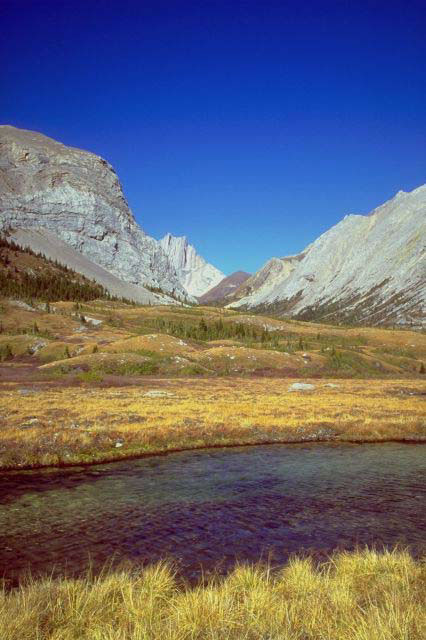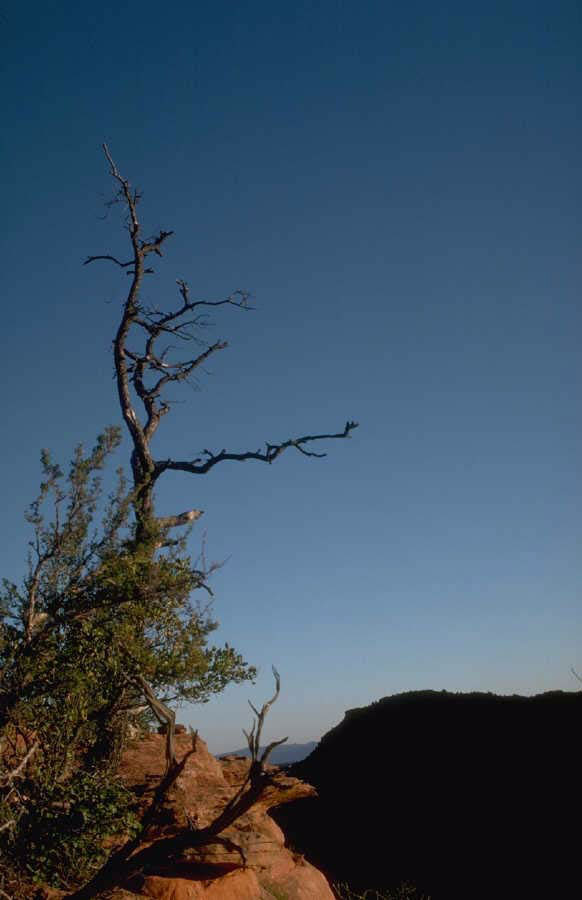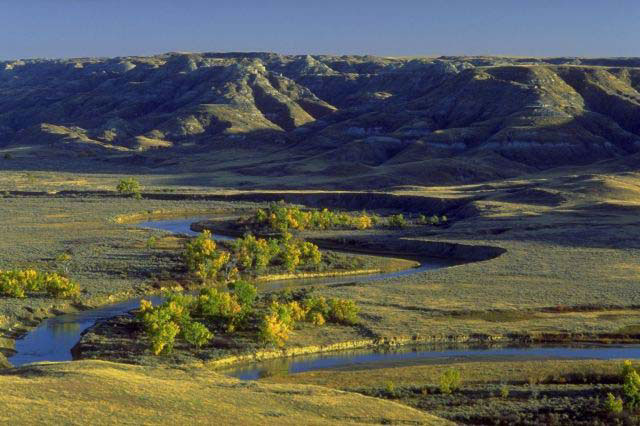| Let him who walks in
the dark, who has no light, trust in the name of the
Lord and rely on his God.
(Isaiah 50:10) |
IN ONE FORM OR ANOTHER all of
us will encounter the Ascent of Toil. Writers commonly refer
to this as a wilderness experience. Such times nearly always
take us by surprise, but the God who covered more than
two-thirds of the earth’s surface with oceans, tundra,
glaciers and deserts uses these spiritual wildernesses in a
special way to aid our preparation for eternity.
The Hebrew word for wilderness, midbar, embraces not only
the rugged terrain of literal deserts, but any land that
could not easily be cultivated. If we can grasp the
spiritual concept that lies behind the midbar it will help
us to make some sense of our times in the wilderness, and
help us to strengthen others who feel bewildered as a result
of them.
Three Types of Wilderness
Spiritual wildernesses, like their geographical
counterparts, come in different shapes and sizes. We will
explore four main types. The most common is ‘The Wilderness
of Sin’ which is largely the result of our own stupidity or
neglect of God. There is also ‘The Wilderness of Satan’ when
our enemy through some illness, attack or other hindrance,
makes it hard for us to feel God’s presence, or to implement
His will in a given situation.
This is rather different from ‘The Waterless Wilderness’
which usually accompanies a dull and dreary stage in our
lives, when nothing much appears to be happening. The fourth
type, ‘The Wilderness of Preparation’ is quite different, as
we shall see.
As young Christians we were taught that if God feels
distant, then it must be that we are the ones who have
moved!
After all, we can usually trace most of our suffering to our
own recklessness or negligence. The Lord sometimes has to
‘close’ our blessings down until we recognize how foolish we
have been. Repentance (literally a turning around) is ever
God’s exit point from these self-induced ‘Wildernesses of
Sin.’1
As our walk with the Lord matures, however, it no longer
suffices to suppose sin to be the sole, or even the chief,
reason for our wilderness experiences. As Tozer put it, ‘To
be right with God has often meant to be in trouble with
men.’
Following the will of the Lord often leads us into the zone
of maximum conflict. On both occasions in the gospels when
we see the disciples in a storm, it was as a direct result
not of their disobedience but of their obedience. It must
have felt like the last straw when they saw their master
sleeping peacefully with his head on a pillow. ‘Look, Jesus,
don’t you care that we’re going to drown? Even if you can’t
do anything about it, at least you could wake up and worry
with the rest of us!’
We love to see the Lord Jesus stilling the storm with a word
but His subsequent rebuke to the disciples for their lack of
faith is a timely reminder to us when we allow unbelief a
foothold in our hearts.2 The moment Jesus sees how convinced
we are of our need for Him, He reaches out His hand to
steady us.
Perhaps satanic powers had whipped this storm up because
they saw the Lord Jesus heading to deliver the demoniac on
the other side of the lake? They certainly make strenuous,
and often highly damaging, assaults on the minds and bodies
of those who are on the front line for the Lord. Many
illnesses, accidents and other intrusive pressures sometimes
conspire to make us feel distant from God – to say nothing
of causing us trouble both in the world and in the Church.
The warfare can be intense.
We need to use our God-given faith and authority to resist
the devil, and to handle these satanically-induced
wildernesses. When the battle is too much for us to bear on
our own, we must enlist the support of praying friends. (It
is usually pride, in one form or another, that stops us from
asking for help!)
|
 |
By contrast, the
Waterless Wilderness requires courage and endurance.
By definition it is monotonous. This brings its own
inherent dangers, for boredom is a condition that
satanic forces are particularly skilled at
nurturing. The dreariness of so many churches, as
well as so many marriages, testify to the handiwork
of unseen forces that rob us one small step at a
time of our enthusiasm for the people, causes and
institutions to which we were once so willing to
give our all. |
Short periods of intense
pressure may actually serve to stimulate our faith. We cry
out best and loudest when crises drive us to our knees.
Coping with prolonged seasons of monotony, or with some
unwelcome change to our situation or status, however, can
often be a greater test. If there is something in us that
inclines us to believe that Jesus is against us, then it
will be the Waterless Wilderness which exposes our heart of
unbelief.
The less that we are prospering outwardly, the more our
inner uncertainties are exposed. A longing for something
fresh and exciting leads not only the young and
impressionable astray, but may even push apparently mature
people into the most outlandish escapades.3
The deeper we plunge into the Waterless Wilderness, the more
acutely aware we become of our helplessness. Is it not when
we recognize our utter helplessness that we lean more fully
on the Lord and learn to esteem others more highly than
ourselves? Is not this what it means to live in the fear of
the Lord?
Difficulties may threaten to overwhelm us, but we should not
back out of our God-given plans, any more than Paul was
prepared to yield to the pleas of his friends and turn aside
from going up to Jerusalem just because they were
prophesying great hardships ahead for him.4
| It is better to
‘harness’ our feelings of inadequacy and cry out to
the God who has unlimited power to help us.5 After
all, many of the Kingdom’s greatest projects begin
in the most unpromising manner – mighty trees from
the smallest seeds. The Lord already sees the
full-grown tree in the seed, as if with double
vision. It is harder for us to do the same.
|
 |
The first Protestant
missionary to China saw just one convert in the first decade
of his ministry, and only one more in the next ten years.
Who could have guessed then that this small-scale work would
one day expand to bring millions into the Kingdom in that
formidably hostile country? Just think of all that would
have been missed if these early missionaries had given up!
Again and again we must set out ‘by night’, not knowing
where our efforts will lead. God has great things in store
for His children, and He loves to turn the night to day.6
The Wilderness of Preparation
The final type of desert is quite different from the others
in that it originates primarily in an initiative from God
Himself. For this reason alone it is less well understood,
yet Scripture provides us with precedents. For example,
shortly after the Lord Jesus was baptized in the Holy
Spirit, He was led (some texts say driven) by the same
Spirit into a literal desert to endure forty days of the
most gruelling testing. Luke declares that Jesus went into
the wilderness full of the Spirit, but that He emerged from
it in the power of the Spirit (Luke 4:1,14).
This distinction between fullness and power is a crucial
one. Many would claim to be filled with the Holy Spirit but
how many of us can honestly be said to be moving in the
power of the Spirit?
Although at first sight the example of Jesus is of an
altogether different ilk from our own experience, I believe
that Scripture shows us that such wildernesses often serve
as a bridge to this deeper anointing. Sometimes, after God
has given us a clear word or vision, the very opposite of
what we believe He has promised begins to happen. This can
be very confusing.
Moses received a genuine call to lead the Israelites out of
Egypt, but Pharaoh rebuffed him repeatedly. He even withdrew
from the Israelites the means to make their daily quota of
bricks, but not the demand that they must be made.
This example is an extreme one, but we may often experience
the principle at work to a lesser extent in our own lives.
The fact is that great testing must precede great service.
Samuel discerned Israel’s future king in a young shepherd
boy, but God intended to train David in a cave before
allowing him to reign in a palace. Saul of Tarsus, by
contrast, was already a mature man by the standards of the
world before his conversion, but he nevertheless required a
further fourteen years of training before the Lord finally
deemed him ready for his mission.
Basilea Schlink felt led to prepare a course of Bible
studies for the wives of prospective pastors. She even went
so far as to set up a house and prepare beds for them.
Because of the Nazis’ hostility towards all things
Christian, however, the facilities remained unused from 1936
right through until 1944. During these eight years she often
wondered what had happened to the promise the Lord had given
her. Later, He developed a ministry through this remarkable
woman on a scale she could never have dreamt of in those
early days.
 |
Spiritual matters are rarely as clear cut as we
would like them to be of course. Several factors
usually combine to make up a wilderness experience.
Even Moses’ initial reason for spending forty years
in the desert appears to owe less to God’s leading
than to his running away after committing an act of
murder! Likewise, the most immediate reason for
Elijah’s time in the southern desert was his fear of
Jezebel. Yet God used all these wildernesses for His
own ends. He is the Lord of the midbar.
|
 |
Nurturing Trust during
Desert Times
The great heart cry of the contemplative saints through the
ages has been that we should learn to live beyond the world
of our immediate senses. In other words, we are to trust the
Lord’s character even when we can no longer discern His
leadings. As Tozer put it:
Repentance is a sincere apology to God for distrusting Him
for so long, and faith is throwing oneself upon Christ in
complete confidence.
God reminds us through these wilderness experiences of how
little control we have over our lives. We can regulate
neither the things that happen to us, nor the flow of the
Holy Spirit in our lives. Jesus wants to be both the
Shepherd who strides ahead to prepare the way for us and the
Staff on which we lean. If it takes the apparent withdrawal
of His presence to make us depend on Him more fully, then so
be it.
Ultimately, it does not matter that we feel bereft. It is
our faith God requires, not our feelings. God is still
ordering the things we experience, and providing us with all
that we need, even during these times when familiar
landmarks and reassuring points of security are being shaken
and can no longer be relied on.
The first thing that happens in any wilderness situation is
that we lose our sense of direction. Spiritually this can be
as disconcerting as when we drive in thick fog and are no
longer able to recognize even the most familiar landscapes.
 |
In The Silver Chair, one of C.S. Lewis’ Chronicles
of Narnia, Aslan, who represents the Lord, gives
Jill Pole a number of signs to look out for in her
adventure. As they stand on a high cliff top they
all seem easy to understand, but Aslan warns her
that they will be much harder to remember and to
recognize at ground level. And so it proved.
This story is a striking illustration of the way in
which almost every vision God gives us passes
through a disorientating wilderness phase during
which the promised goal appears tantalizingly far
out of reach.
|
It is not easy to cope with
these unsettling times, when precious props are removed from
our lives, and strong desires remain unfulfilled. But we can
be encouraged. If the Lord leads us into a ‘Wilderness of
Preparation’, it is actually a sign of spiritual promotion,
rather than the demotion it feels like at the time.
Jesus will bring us safely through every wilderness, and He
is trusting us to keep going. All His promises will be
fulfilled, because His commissions contain His hidden
provision. He who sent us out will also provide all that we
need to make it to the end of our journey.
Many years ago I went for a walk one Pentecost Sunday
morning to ask the Lord what He wanted me to do with my
life. I had been through a prolonged wilderness, and was in
great distress of spirit, convinced that my many failings
meant the end of everything. As I sat beside a canal, I
heard the Lord’s voice again: ‘I have empowered you as a
speaker, but I have called you to be a writer.’
On the following day a man who knew nothing about what I had
heard the day before brought me this word of prophecy: ‘I
have a message, I have a pen, I need a writer. If you are
willing, I will be with you.’ The Lord had given me both
confirmation and commissioning, and it helped to bring me
out of that particular wilderness.
For Reflection
All of us need encouragement to keep going through times of
wilderness. When temptations assail us and the enemy comes
in like a flood (as they are bound to do if we are making an
impact for the Lord!) it is good to remind ourselves that
the Lord is very careful in the things He allows to come our
way. He has not suddenly gone off duty.
| The
situation that you are dreading, and finding so
hard, may actually be the very means by which the
Lord intends to mature and refine you. Even though
you feel as though you are being laid on one side at
the moment, take heart: He is still working out His
purposes for you, and He has not forgotten your
address! The more cheerfully you embrace His will
and set your heart to praise Him, the more easily
you will endure this wilderness time, and emerge
from it in the power of His Spirit. |
 |
Selah
Thank You, Father,
that You are Lord of the wilderness.
Whatever the reason for the difficult times I am going
through now,
please use them to further Your own purposes.
In Jesus’ name, Amen.
References
1. Psalm 32:3-5 .
2. Mark 4:35-41.
3. The Church has been slow to recognize, let alone to teach
about the mid-life crisis, which can affect people as young
as in their early thirties. This is the time when many
married couples break faith with one another, perhaps
because one or both partners are seeking an unattainable
degree of romance and excitement. When reality fails to
measure up to their inflated expectations, the relationship
is abandoned, and the people concerned condemn themselves
(and others) to further forlorn attempts to fulfil their
impossible desires.
I suspect that certain parts of the charismatic movement may
likewise have inadvertently fuelled people’s expectations to
a frankly unrealistic pitch. This often leads to factions,
splits and, in the long term, causes much unhappiness. We
would do well to heed these words of John Henry Newman: To
take up the cross of Christ is no great action done once for
all; it consists in the continual practice of small duties
which are distasteful to us.
4. Acts 21:4-14.
5. Hallesby makes this point about our helplessness
splendidly in his book, Prayer (I.V.P.).
6. Psalm 139:12
|